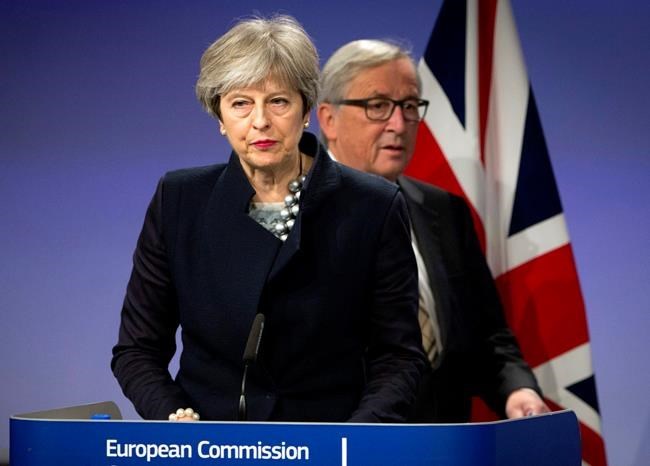
European Commission President Jean-Claude Juncker, right, walks behind British Prime Minister Theresa May prior to addressing a media conference at EU headquarters in Brussels on Monday, Dec. 4, 2017. British Prime Minister Theresa May and EU Commission President Jean-Claude Juncker held a power lunch on Monday, seeking a breakthrough in the Brexit negotiations ahead of a key EU summit the week after. (AP Photo/Virginia Mayo)
Republished December 06, 2017 - 8:37 AM
Original Publication Date December 05, 2017 - 5:56 AM
LONDON - The U.K. government acknowledged Wednesday that it has made no detailed assessment of the economic impact of leaving the European Union, as its lack of preparation for a momentous break became clear.
David Davis, the official shepherding Britain's departure from the 28-nation bloc, said the nation should be prepared for a profound shift in the way the economy operates on a scale similar to that of the 2008 financial crisis.
He told a parliamentary committee that since Britain must prepare for a "paradigm change," in the economy, any assessment in the automotive, aerospace financial services or other sectors would fail to be "informative."
The House of Commons' Brexit committee's chair, Hilary Benn, described the decision as "rather strange" given the historic decisions at hand and since authorities wish to start renegotiating Britain's trade relations with the rest of Europe within weeks.
"You have said there are no impact assessments," Benn said. "You were hoping that, at the October (European) Council, the door would be open to phase two of the negotiations, where the question would be asked 'What does the U.K. government want?'
"Are you actually telling us that the government hadn't at that point — and still hasn't — undertaken the assessment?" Benn asked.
Davis told the committee he didn't need a formal impact assessment.
"I'm not a fan of economic models because they have all proven wrong," Davis said. "When you have a paradigm change — as happened in 2008 with the financial crisis — all the models were wrong."
But as the day wore on, the government's last minute-planning became more evident.
Treasury chief Philip Hammond revealed that Prime Minister Theresa May's closest advisers in her Cabinet had not yet had a full discussion of the "end state position," the status the U.K. would aim to have once it leaves the EU. In testimony before the House of Commons Treasury Committee, Hammond said it was too soon to have such talks.
He said that would happen once the EU accepts to move the Brexit talks on from the divorce issues to the question of future relations, like trade.
"We are not yet at that stage and it would have been premature to have that discussion before we reach that stage," he said.
Britain and the EU on Monday came close to agreeing on key divorce terms, including how to maintain an open Irish border after the U.K. — including Northern Ireland — leaves the EU.
But the agreement was scuttled at the last minute when the Democratic Unionist Party, which props up May's minority government, warned it wouldn't support a deal it saw as undermining Northern Ireland's place in the United Kingdom.
Foreign Secretary Boris Johnson said that a solution to the issue "can only be discovered in the context of discussions on the end state of the U.K.'s relations with the rest of the EU."
"We are going to take back control of our borders, of our laws and of U.K. cash contributions and that's the way forward," he added.
May was expected to hold talks with top EU officials later this week.
Britain and the EU have only days to clinch a deal on the divorce terms — the Irish border, Britain's financial exit bill and the rights of citizens hit by Brexit — before a Dec. 14-15 EU summit that will decide whether Brexit talks can move on to future relations and trade.
The lack of progress so far has raised concerns that Britain may not have a deal by the time it officially leaves on March 29, 2019, and heightened fears that May's government could collapse.
Business leaders in particular are expressing alarm at the lack of certainty in the process. The chief executive of manufacturers' organization EEF, Stephen Phipson, warned that inability to secure a transition deal before Christmas would be costly.
"While international companies appreciate the nuances of complex negotiations, they will assess the situation based on the facts at hand and all they will be able to see is the probability of a cliff edge looming on the horizon," he said.
News from © The Associated Press, 2017